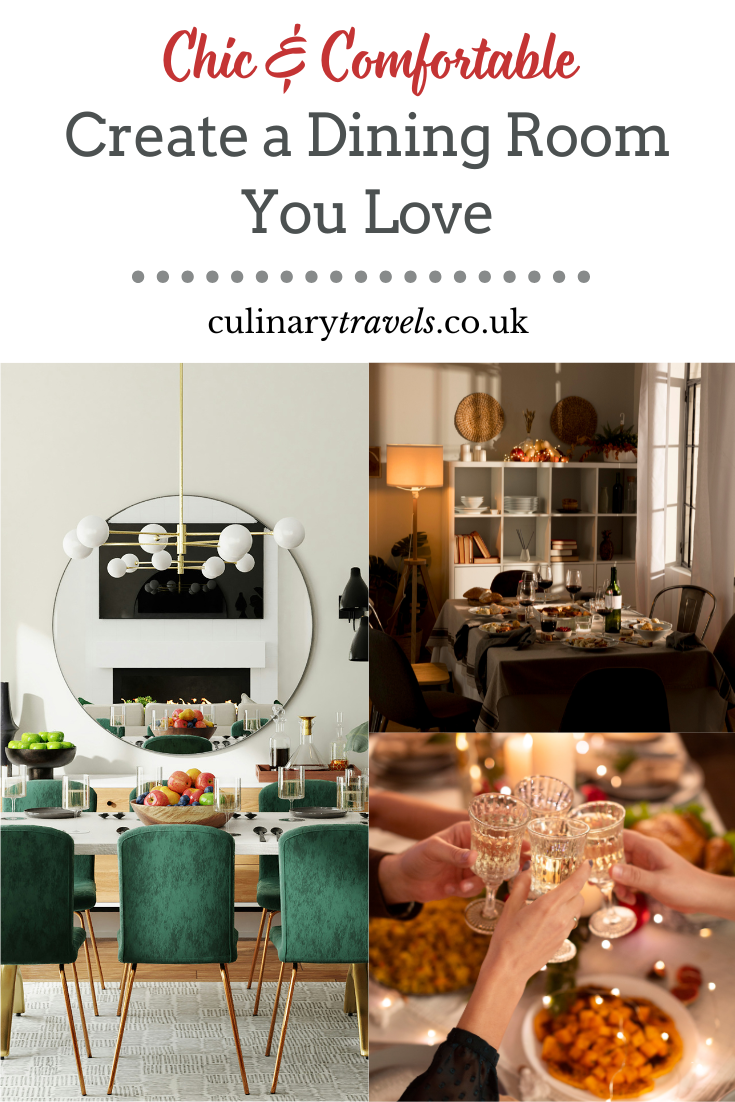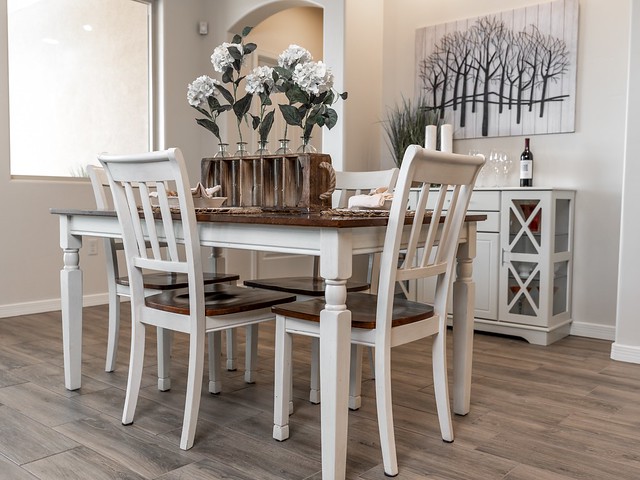Blog
The Art of the Perfect Dining Room: Style, Comfort & Entertaining Tips

This feature was produced with support from a commercial partner. Editorial control remains with the author.
The dining room is more than just a table and chairs—it’s where life unfolds. It’s where morning coffee warms sleepy hands, laughter spills over Sunday roasts, and stories are shared across generations. Designing a dining room thoughtfully transforms it into the heart of your home, perfect for family rituals and memorable dinner parties.
Consider the Size of Your Dining Room
The size of your dining room shapes how it feels and functions. A small space for three or four people can feel cosy, but leaving room for extra guests ensures comfort and ease of movement. When planning, measure carefully and imagine the space during a busy dinner party—it’s better to have a little breathing room than to squeeze in furniture that overwhelms.

Understand the Room’s Purpose
Ask yourself: will this be a casual spot for weekday breakfasts, a sophisticated venue for dinner parties, or both? Its intended use informs everything from the table size to lighting choices. A room meant for formal gatherings might need a larger table and statement lighting, while a casual family space can focus on comfort and flexibility.

Choosing the Right Furniture
Furniture is more than functional—it sets the tone of the room. Round tables foster intimate conversation, while rectangular tables accommodate bigger gatherings. Chairs should be comfortable for long dinners and correctly proportioned to the table height. Don’t forget storage: sideboards and cabinets keep dinnerware and linens accessible without cluttering the room.
Tip: Mix textures and materials—wood, metal, and upholstered pieces create depth and personality.

Thoughtful Layout and Flow
A well-arranged room feels spacious and inviting. Avoid crowding the space with oversized pieces. Cabinets and storage should be positioned in corners, allowing clear pathways for movement. If the room is narrow, consider a bench on one side of the table—it can tuck under when not in use, freeing up floor space.

Accessories and Focal Points
Small details make a big impact. A bold chandelier, a fresh flower arrangement, or a striking piece of artwork can serve as a focal point, drawing the eye and unifying the room’s aesthetic. Decorative trays, candles, or seasonal touches add warmth and character, making the space feel curated rather than staged.

Lighting for Atmosphere and Function
Lighting sets the mood and ensures functionality. Overhead lights illuminate the entire room, while pendant lights or lamps can highlight key areas. Consider dimmable options to adjust for everyday meals rather than dinner parties. Layering light sources—ambient, task, and accent lighting—creates a welcoming atmosphere for every occasion.

Flooring That Complements Your Design
Flooring can make or break a room’s aesthetic. Laminate offers easy maintenance, tiles bring sleek elegance, and marble radiates luxury. Adding a rug under the table not only defines the dining area but also adds texture and warmth. When choosing flooring, consider durability, style, and how it works with your furniture and overall décor.

Personalising Your Dining Room
This is your space to reflect personality and lifestyle. A reading nook in one corner, a display of family heirlooms, or a statement mirror can make the room feel uniquely yours. Seasonal changes—fresh flowers in spring, warm textiles in autumn—keep the space dynamic and inviting.
Hosting the Perfect Dinner Party: Beyond the Décor
A beautifully designed dining room sets the scene, but it’s how you use the space that makes guests feel welcome. Whether it’s a relaxed family-style supper or a more elegant evening, a few thoughtful touches can turn your dining room into the perfect place to host.
Set the Mood Early
Lay the table before guests arrive — even if it’s simple. A linen tablecloth or runner, neatly stacked plates, and a small floral arrangement or candles instantly make the room feel considered. If you prefer a more casual feel, go family-style with dishes placed down the centre of the table.
Layer the Ambience
Lighting, music and scent work better together than any singular detail. Keep overhead lighting on a dimmer or use a statement pendant alongside candles or soft side lamps. Choose low-volume background music that suits the atmosphere — acoustic, jazz or mellow instrumental playlists work effortlessly. Avoid overpowering fragrances; a lightly scented candle or fresh herbs in a jug of water add a subtle aroma without overwhelming the food.
Make Serving Easy
If space allows, use a sideboard, cabinet or bar trolley as a dedicated serving area. It keeps dishes, extra plates, jugs of water and drinks close by — without overcrowding the table. In smaller dining rooms, a console table or even a kitchen counter nearby can act as a mini serving station.
Keep Comfort in Mind
Simple touches make guests linger longer — comfy seat cushions, throws over chair backs, water within reach, and avoiding overly large table décor that blocks conversation. Ensure chairs have enough space to pull out easily and no one feels boxed in.
Let Conversation Flow
Round tables naturally encourage conversation, while rectangular tables work best if you keep the centre uncluttered. Candles or low floral arrangements allow for easy eye contact, while harsh overhead lighting or tall vases can interrupt connection.

Dining Table Styling Ideas (For Every Day & Special Occasions)
Your dining table doesn't need to be reserved for special occasions to look beautiful. A few simple styling habits can make it feel inviting every day — and with just a little extra effort, it can be transformed for guests in minutes.
Everyday Styling
For daily use, keep things simple and practical. A linen runner, woven placemats or a neutral ceramic bowl filled with fruit brings natural texture without clutter. A small plant or vase of fresh greenery adds life to the surface without getting in the way of plates and elbows.
Seasonal & Statement Centrepieces
For something a little more dressed up, start with a focal point in the middle of the table. It could be a vase of wildflowers, a cluster of candles of different heights, a bowl of citrus in summer or mini pumpkins in autumn. Keep it low enough for guests to make eye contact across the table — anything taller than a wine glass tends to block conversation.
Linen, Layers & Texture
Tablecloths work well for formal dinners or if you want to soften the space. Runners offer a modern alternative and show off the table beneath. Mix textures — linen napkins, wooden trays, ceramic jugs — to give the table depth without overwhelming it.
Function Meets Aesthetic
The most successful table styling still leaves space for the real stars of the evening — the food and the people. Make sure there’s enough room for glasses, serving dishes and elbows to rest comfortably. Think beauty, but make it usable.

Common Dining Room Mistakes to Avoid
Sometimes it’s not about adding more, but avoiding the small habits that take away from comfort and style. These are the most common missteps in dining room design makeovers — and how to fix them easily.
Lighting That’s Too Bright (or Too Dim)
A single overhead light can feel harsh, while low lighting can make it difficult to see your meal. Layer your lighting with a statement ceiling light, soft wall lamps or candles so you can adjust the mood depending on the occasion.
Rugs That Are Too Small
A rug that only fits under the table looks cramped. Ideally, it should extend at least 60cm beyond the table so chairs can slide in and out without catching on the edges.
Pushing All the Furniture Against the Walls
Leaving the table floating in the centre (even in a small room) creates balance and makes the space feel more intentional. If you do use cabinets or sideboards, keep them to one wall to avoid crowding.
Oversized or Uncomfortable Chairs
If the chair height doesn’t match the table, eating becomes awkward. Aim for around 25–30cm between the seat and the underside of the table for comfortable leg space.
Overdecorating the Table
Tall centrepieces, lots of ornaments or cluttered trays might look good in photos, but make it difficult to pass dishes or speak to the person opposite you. Keep décor low, breathable and removable once dinner starts.

FAQs: Dining Room Design
How much space should I leave around the dining table?
Ideally, allow at least 90cm (3ft) between the edge of the table and walls or furniture to ensure chairs can be pulled out comfortably and guests can move around freely.
What is the best lighting for a dining room?
Layered lighting works best. Combine an overhead chandelier or pendant for ambient light with wall sconces or table lamps for softer, atmospheric lighting. Dimmable lights add flexibility for different moods and occasions.
How can I make a small dining room feel larger?
Use light colours, mirrors, and furniture that fits the scale of the room. Round tables, benches, and multi-functional storage can also help maximise space.
What flooring is ideal for a dining room?
Laminate, tiles, or vinyl are the best durable, easy-to-clean options. A rug defines the dining area and adds warmth underfoot. Choose materials that complement your furniture and décor style.
How can I make the dining room more inviting?
Add personal touches like artwork, plants, or family photos. A statement chandelier or fresh centrepiece draws the eye, while layered textures and soft furnishings create comfort.
Note: Originally published November 2020; updated October 2025.
✨ Stay Connected with Culinary Travels ✨
Loved this post? 🍴 Don’t let the conversation end here! Join me for behind-the-scenes kitchen moments, foodie adventures, and plenty of inspiration:
👉 Facebook | Instagram | Pinterest
💌 Got thoughts, questions, or your own foodie stories to share? I’d love to hear from you — just drop me a note through my contact form.
📬 Hungry for more?
Subscribe to my newsletter for exclusive recipes, travel tips, and behind-the-scenes foodie fun: Sign up here
🌍 Sharing is caring! If this post made you hungry for more, please pass it along. Every share helps this little corner of the internet grow, and I’m so grateful for your support. ❤️
Disclaimer: All images were obtained from a variety of stock photography sources.






What Our Followers Say
"Oh yum!!! I could eat one or two right now!"
Sami Tamimi
"Georgina was great to work with, quick to respond, and is an excellent content writer - would highly recommend collaborating with her!"
Nick S, Get Blogged
Our list of things to do in Cork has just expanded hugely thanks to Culinary Travels.
Triskel Art Centre Cork